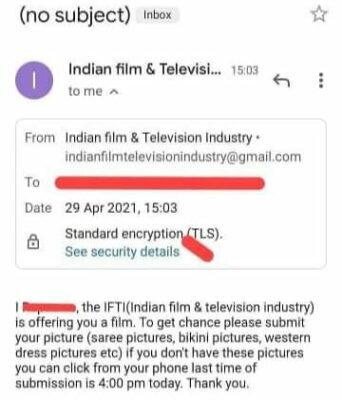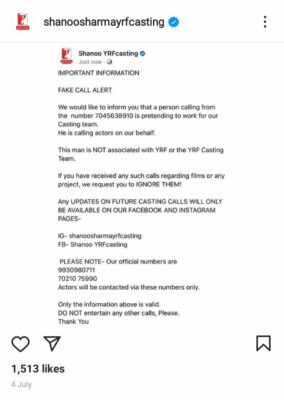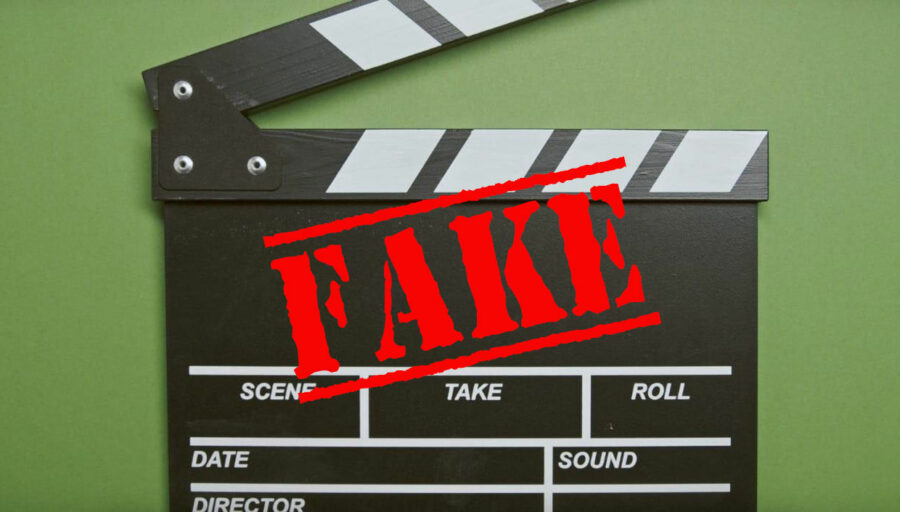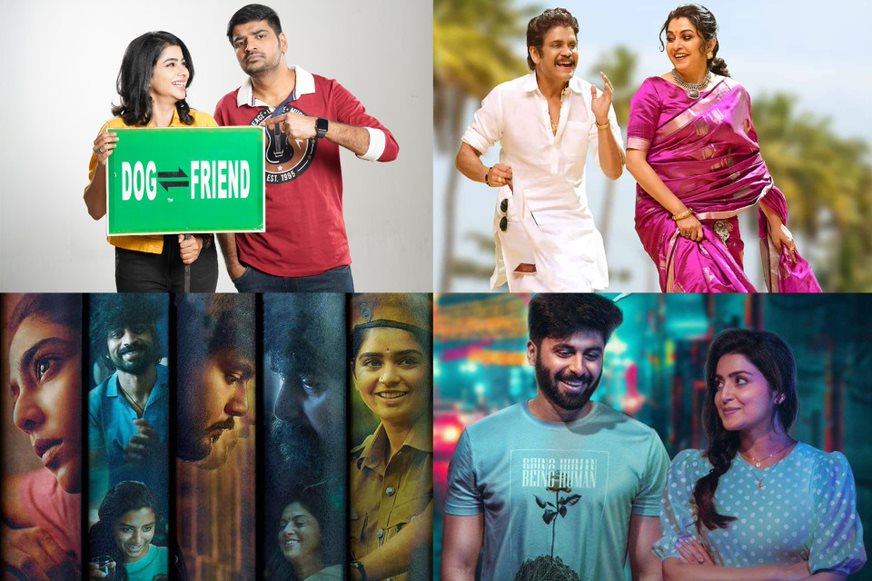In the 1994 cult Hindi comedy film Andaz Apna Apna, one of the recurring comedic tracks is Prem’s (Salman Khan) quest to become a hero in Bollywood. The down-on-his-luck struggling actor spends much of his time and money at Waah Waah Studios believing the fake casting director “Malairiye Johnny” that director Subash Ghai wants to cast him in a film opposite Juhi Chawla and Madhuri Dixit. “Madhuri only wants to work with you and she even kept a photograph of you for herself,” Johnny tells a naïve Prem. We are told that even Amitabh Bachchan has graciously agreed to play his father in a new film.
While Prem thinks that things are going well for him, it could not be more obvious to us that he is getting duped. The hilarity lies in Johnny’s poorly crafted scam to make a quick buck and Prem’s inability to see through it.
More than two decades have passed since the film’s release yet many up-and-coming actors in Mumbai suffer a fate similar to Prem’s. This however is neither as funny nor as easy as seen in the movie.
Hindi television actor Karan Suchak tells Silverscreen India that he has been called for several fake auditions. Earlier this year in February, Suchak received a call from a woman who claimed to be calling from Mukesh Bhatt’s production house Vishesh Films. She told him that they wanted him to audition for a role in Hate Story 5 where he will be sharing screen space with actors Randeep Hooda and Yami Gautam. “While I didn’t doubt it at the time, I was still sceptical about the entire approach. They asked me to share an introduction shot and a shirtless picture of me on WhatsApp,” he recounts.
Thankfully for Karan, his knowledge about the casting process prompted him to make a few calls before getting invested in the film. “I spoke to a couple of colleagues and they informed me that there is no Hate Story 5. The woman tried calling me back-to-back. She kept asking for the audition clips and photographs. I just stopped responding to her calls,” he adds.
Karan is not the only one. For many actors, especially newcomers, getting duped by these scams has become increasingly common. Despite the announcement of several lockdowns and halting of movie shoots, it’s business as usual for fake audition rackets. Keeping up with the times, many scam artists have moved their businesses online and struggling actors are their bait.
Decoding Fake Auditions
“Newcomers who are excited and do not have much experience in the industry end up becoming easy targets,” says Karan.
Eager and unaware of the casting process, they become more susceptible to falling for a fake call. “Because of fake auditions, we are unable to get proper work as we waste most of our time running around and attending them,” says upcoming actor Uttam Kumar.
The process to run a fake audition is fairly simple. Those involved send messages to multiple people and when they get responses from even one or two of them, they try to extort money. While it may only be around a hundred to three hundred rupees, it becomes a profitable venture for them because they manage to scam many aspiring actors over time. Most scams expect money for “grooming” and workshops, which prompts some artists to stop responding to them.
A pan-Indian phenomenon, those who run these rackets make it a point to keep up-to-date with actual casting calls to dupe actors in smaller cities who do not have knowledge or access to big casting agencies.
Lessons Learnt
Over time, actors have learnt to distinguish between real and fake auditions.
Legitimate auditions always come through production houses and their coordinators who reach out to actors by looking them up on their company database. “You have these coordinators and production houses. Anyone who wants to enter a certain project has to speak to the casting people and mail them their profile. That’s how you directly get involved with the production houses without any third-party interference,” says Karan Suchak.
Entertainment anchor and voiceover artist Subhojit Ghosh says, “One should be on the lookout for the location of the audition. If it is a proper office or studio then it’s genuine. In the case of fake ones, audition calls take place in private flats or over coffee. Ninety-nine per cent of these auditions are fake.”
With auditions moving to the online space, these actors are aware that legitimate emails and calls will come from registered numbers and IDs. And if they are still in doubt, they now call up the respective casting director to verify the casting call.

Despite being wary of fake calls, actors cannot shrug off their personal experiences. Uttam Kumar has been trying for three years to get a break in the film industry. In pursuit of this, he has been duped by fake production companies several times before understanding the process of such scams.
Last year, Uttam was called for an audition at Park Street in Kolkata. Recollecting the incident he says, “I was asked to wait along with other actors who had come there for auditions. After an hour or so, I was called in and they told me that it was a bold scene. I was stunned because they asked me to remove my clothes. It was a lovemaking scene and so, I agreed on removing just my shirt.” Uttam is yet to receive a callback from them.
“Now, whenever I get an advertisement for a casting call, I first call the number and get the name of the production house. I also see if there are any charges involved and verify if the casting call exists,” he says.
To see for ourselves, one of Silverscreen’s reporters responded to a fake casting call on Facebook. The person-in-charge sent a detailed message, “It’s a Kannada, Hindi, Tamil, Telugu language movie.” Along with the requirement to pay Rs. 300, the reporter was asked to register their name. We were also given an explanation for the need to make the payment. “We have to pay the government under your name for your security in shoot time under Covid-19 pandemic situation.” The person then asked for an audition video to be sent to their number.

“Actors shouldn’t be paying for Covid-19 guidelines and if they are being asked to, that’s problematic,” says actor and casting director Karan Mally. “If they ask for money or nude pictures, then it is a fake audition.”
Increased Vigil
These scams, however, do not go unnoticed. This year alone, the Times of India reported three separate instances of the Mumbai Police arrested individuals for running fake auditions. In July, director Rajkumar Hirani’s office filed an FIR with the police after someone created a fake Instagram profile impersonating Hirani’s son Kabir. The individual put out a casting call for actors to audition for a film called “Teenage Cinema” and even sent messages demanding money to those who responded to the call.
These actors are not the only ones who are frustrated. Casting directors across the industry unanimously agree that fake casting calls have increased during the pandemic. Casting director Tess Joseph tells Silverscreen India, “With access to social media, these instances have become more rampant. Before, we would sit in our offices and audition actors, but post the pandemic and shutting of formal office spaces, online auditions/self-tapes have become the norm. This allows for fraud/fake casting calls.”
Most casting directors remain unaware of the scams that take place in their name unless an actor reports it to them. Even then, very few take legal action. For many, it is simply a waste of time because of the difficulty in filing the complaint and finding the perpetrator.
There is no formal association to investigate complaints on fake auditions. Most cases are reported to the local police station and if it’s in relation to social media, then to the Cyber Crime Branch.
Casting director Karan Mally thinks that he might have even attended a few of these auditions during his early days in the industry. “When you start, you don’t think that 500 rupees are a lot because you are getting a chance to audition. This is untrue because an audition should never be charged as it is a way for a production house to find an actor for themselves,” he says.
When actors arrive in Mumbai, they find out who the casting people are and they email them. “We have a database. When there is an audition, we call people from there or we contact acting schools and ask them if they have any student who fits the role,” Mally says. Despite the legitimacy and corporate nature of conducting auditions, the rampancy of phoney casting calls remains a problem.
Even if casting agencies decide to not bust these scams, they still have a good system in place to counter them. Actors do not hesitate to call them up or send them the messages they receive from fake profiles. “Nowadays, when someone creates a fake account on Facebook and sends a message impersonating a big casting director, actors check with us. Most people know who the casting people are,” says Mally.

Unions to the rescue
Regardless of the type of racket or the intention of these scams, artists and casting directors note that they are nothing short of detestable. “The intention can be anything. It can be to leak the phone numbers, private information, or photographs. Whatever be the intention, the overall objective is malicious,” says Subhojit Ghosh.
As most fake audition rackets continue to go unchecked, the industry feels that a union for actors is the best approach. While Indian casting directors do not have their own union, Tess Joseph says, “The role of a union is key to this. I would suggest that they speak to Cine and TV Artistes’ Association; they are dynamic and want to help actors. Globally, unions are strong and accessible- even CSA (Casting Society of America) is involved in helping and safeguarding the casting teams & the actors’ community.”
Recommended
While a replica of such a system in India might take time, for now, the only way that actors can steer clear of false auditions is to familiarise themselves with the casting process. Casting directors believe that actors should know to have knowledge about the industry and must only respond to calls from official pages.
However, swifter action for these scams is a priority for these casting directors. “There needs to be quicker repercussions and bans on the people who are involved. The idea should be to investigate and solve the issue. As an industry professional, I don’t want this problem to grow larger, and for that, there need to be awareness and easy access for actors to complain or take a grievance,” says Tess.



